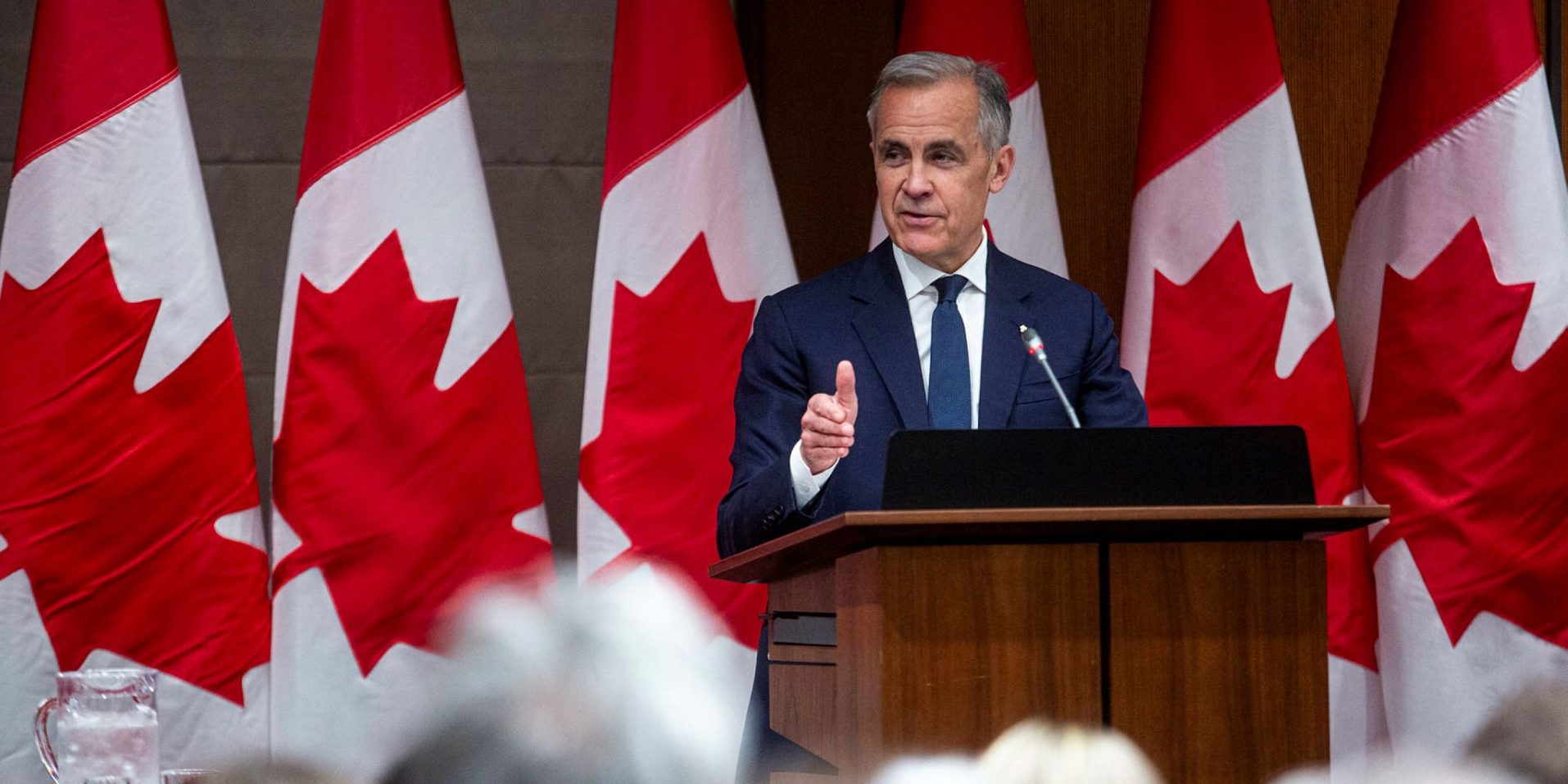International trade, the economy top-lobbied issues in April, and Ford, GM led the way

International trade concerns emerged as the most popular overall subject in federal lobbying in April, which included an organization urging the federal government to set a new course for Canada’s innovation ecosystem to help weather what they call “the biggest economic and security crisis in our country’s postwar history,” in a recent report.
“Officials are increasingly looking for practical ways to strengthen Canada’s innovation ecosystem, especially amid a shifting global landscape shaped by trade tensions and renewed efforts to build domestic capacity,” said Daniel Perry, director of federal affairs for the Council of Canadian Innovators (CCI), in an emailed statement to The Hill Times on May 28. “This is a pivotal moment for economic policy, and we plan to be at the table with this new government every chance we get.”

Amid ongoing trade tensions with the United States, the subject of international trade was listed in 167 communication reports in April, surpassing any other topic for discussion in federal lobbying that month. The subject of economic development followed closely behind, appearing in 159 communication reports.
In terms of lobbying about international trade, vehicle firms Ford Motor Company of Canada and General Motors of Canada led the way in April, filing 11 and eight communication reports, respectively, listing that subject.
On April 3, U.S. tariffs of 25 per cent on Canadian automobiles came into effect, and this country responded with countermeasures including 25-per-cent tariffs on non-Canada-U.S.-Mexico Agreement (CUSMA) compliant fully-assembled vehicles imported into Canada from the U.S., and with 25-per-cent tariffs on non-Canadian and non-Mexican content of CUSMA-compliant, fully-assembled vehicles imported into Canada from the U.S.
The Hill Times reached out to both Ford and General Motors to ask if the issues discussed in April were motivated by current tariffs. Ford Motor Company did not respond before The Hill Times’ deadline, and Marie Binette, GM Canada’s senior manager of corporate affairs and executive communications, responded in an email on May 28 only to say that the company “regularly engages with various policymakers on issues impacting our industry, employees, and customers.”
Ford Motor Company and the CCI were tied as the most active organizations overall in April, each contributing 11 communication reports for the month. Of CCI’s 11 reports, two listed international trade as a subject for discussion, which were for communications that took place on April 4 with Elizabeth Beckett, director general of regional operations for the Atlantic Opportunities Agency (ACOA), and on April 25 with David Boland, director general of regional operations for Newfoundland and Labrador for ACOA.
CCI released a policy report on May 6 intended to provide a blueprint for Canadian economic growth. Perry said in the emailed statement that, with the policy report, the CCI is engaging the federal government on priorities including privacy reform, modernization of the Scientific Research and Experimental Development Tax Credit Program, and “tech sovereignty.”
Canada is at a crossroads, and the recently-elected government “must hit the ground running,” according to the report.
“The assumptions that shaped our economy for the last century—that prosperity would flow from branch-plant manufacturing, deep U.S. integration, and raw resource exports—no longer hold. The world has shifted, and Canada must shift with it,” reads the report.
“To reverse course and substantially raise our standard of living, we need nothing less than a fundamental shift in how governments and domestic industries work together. Only through serious, strategic partnership can we secure good jobs, strong healthcare, and affordable housing for Canadians.”
The report includes recommendations for the federal government including developing an independent innovation agency “that moves at the speed of business.” The report also recommends taking measures to help attract innovation talent to this country, including expanding programs such as the Global Talent Stream, and to “market Canada as a stable alternative” to the U.S.
The CCI is represented on the registry in-house by its president, Benjamin Bergen, and by consultant Karen Moores of Town Advocacy.
In terms of overall communication reports in April, the U15-Group of Canadian Research Universities followed closely in second place with 10 reports filed. Dylan Hanley, U15’s executive vice-president, told The Hill Times that the group was reaching out to public office holders last month to discuss how research institutions are willing to “step up for Canada,” in response to current global instability, amongst other issues.

“We believe our leading research universities punch way above their weight for the size of our country, internationally, and we want to make sure that we’re stepping up to the plate ourselves in the ways that we’re able to contribute,” said Hanley.
U15-Group released a “roadmap for homegrown success” on May 27, which, like the CCI report, described Canada as being at a crossroads, and argued that leading research universities are an asset that should be leveraged.
According to the report, the recently-elected Liberal government should commit to expanding Canada’s talent pipeline by closing the graduate degree gap with OECD peers, strengthening research training programs, and “rebuilding Canada’s global reputation to attract the best and brightest from around the world.”
Other recommendations in the report included helping to build out domestic research by establishing a “Sovereign Technologies Fund” to provide investments in fields like artificial intelligence, cybersecurity, quantum and energy.
Hanley said that he doesn’t think it’s a secret that Canada’s previously “comfortable and familial relationship” with the U.S. has been shaken in recent months.
“We’ll always be close to the United States, but I do think it has opened our eyes to the need for Canadian sovereignty, and that’s what we’re talking about in that roadmap document,” he said. “On developing talent, we need to urgently explore initiatives to attract the best and brightest talent into Canada, and support more of the talented researchers that are already here. That means boosting support for graduate students and early career researchers, as well as finding ways to welcome world renowned academics to Canada.”
Last month, the U15-Group of Canadian Research Universities communicated with ISG Senator Stan Kutcher (Nova Scotia) on April 8, and with Valerie Laflamme, associate vice-president of the Social Sciences and Humanities Research Council on April 9 and April 30.
The organization is represented on the registry in-house by Chad Gaffield, its CEO.
Top organizations lobbying on international trade in April
| Organization | Communication Reports |
| Ford Motor Company of Canada | 11 |
| General Motors of Canada | 8 |
| ArcelorMittal Dofasco | 7 |
| FCA Canada | 6 |
| Cereals Canada | 6 |
| Bombardier | 5 |
| Canadian Steel Producers Association | 4 |
| Canola Council of Canada | 4 |
| Canadian Vehicle Manufacturers Association | 4 |
| Aluminum Association of Canada | 4 |
| Fisheries Council of Canada | 4 |
| Spirits Canada | 4 |
The above table shows the organizations that filed the most communication reports listing international trade as a subject for discussion in April, based on a search of the federal lobbyists’ registry on May 27, 2025.
Top overall lobbying organizations in April
| Organization | Communication Reports |
| Council of Canadian Innovators | 11 |
| Ford Motor Company of Canada, Ltd. | 11 |
| U15-Group of Canadian Research Universities | 10 |
| General Motors of Canada Company | 8 |
| ArcelorMittal Dofasco | 7 |
| Bell Canada | 6 |
| Bombardier Inc. | 6 |
| Business Council of Canada | 6 |
| Cereals Canada Inc | 6 |
| FCA Canada Inc. | 6 |
| Goodyear Canada Inc. | 6 |
| Nisichawayasihk Cree Nation | 6 |
The above table shows the organizations that filed the most overall communication reports for lobbying activity in April, based on a search of the federal lobbyists’ registry on May 27, 2025.






 LICENSING
LICENSING PODCAST
PODCAST ALERTS
ALERTS













